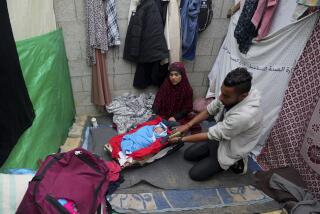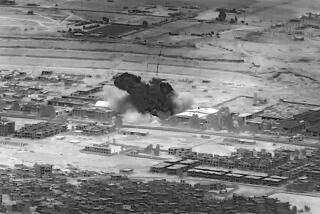Sunnis, Shiites targeted in suicide blasts in Baghdad
- Share via
BAGHDAD — Suicide car bombers Thursday struck on opposite sides of the capital and at a police station near the Syrian border, in attacks apparently intended to show the resilience of Al Qaeda-inspired militants in the face of a U.S. troop buildup and opposition from former allies.
At least 59 Iraqis, including a journalist, were killed in these and other attacks or found slain. Two foreign soldiers, one U.S. and one British, were also reported killed in separate incidents.
In a rare interview, radical Shiite Muslim cleric Muqtada Sadr blamed the U.S. presence for Iraq’s persistent bloodshed and called for “cultural resistance” against Western influences. He reached out to moderate Sunni Arabs in the televised interview, saying they shared a common enemy in the extremists who bomb Sunnis as well as Shiites.
U.S. commanders, under mounting pressure here and in Washington to show results, have repeatedly warned that militants will seek to inflict maximum damage ahead of September, when American military officials in Iraq are due to submit an assessment of the troop buildup to Congress.
In the day’s worst attack, a suicide bomber detonated his explosives-laden truck at police headquarters in Rabia, a town about 70 miles northwest of Mosul near the border with Syria, said the local police chief. The blast collapsed the building, killing nine people, including at least five policemen, and injuring 27 others, police and hospital officials said.
Two British nationals were believed to have been among the injured, the British Embassy in Baghdad said. It was not immediately clear what they were doing in the area.
Umm Khudur was making bread on the roof of a neighboring building at the time of the attack.
“I felt a wave of hot air lifting me up,” the woman, who asked to be identified by her traditional nickname for her safety, said in a telephone interview. “I fell down and fainted. I woke up and found myself in the hospital.”
U.S. officials believe insurgents are striking in the Sunni Arab-dominated region around Mosul as U.S.-led forces focus on stamping out violence in Baghdad and its surrounding area, driving out militants.
A journalist with the independent Aswat al Iraq, or Voices of Iraq, news agency was gunned down Thursday near her home in Mosul, police said. Colleagues said Sahar Hussein Haydari had appeared on a death list issued by a local leader in an insurgent umbrella group known as the Islamic State of Iraq. Another journalist in the same news organization, Nazar Abdul Wahid Radhi, was killed last week in the southern city of Amarah. Last month was one of the deadliest on record for journalists in the Iraq conflict, with at least 12 reported killed.
In Baghdad, where thousands of additional U.S. and Iraqi troops have deployed since mid-February, two suicide car bombers struck within minutes in the western Abu Ghraib area. The U.S. military said at least four people were killed and five injured, though Iraqi police put the casualties at five dead and a dozen wounded. The blasts, about four blocks apart, destroyed a Shiite mosque and inflicted heavy damage to a Sunni one, the military said.
U.S. officers suggested the attack in a Sunni Arab stronghold may have been aimed at tribesmen and nationalist guerrilla groups that have turned against Al Qaeda-linked militants in recent months and begun negotiations with the U.S. military and Iraqi government.
Across town, a suicide bomber blew up a minibus in line at a checkpoint to get inside Sadr City, a bastion of cleric Sadr’s powerful Al Mahdi militia, killing eight people and injuring 14, police and hospital officials said. The U.S. military confirmed four dead and eight wounded.
Abbas Hussein, who sells ice, said he was chatting with an officer in the shade of his flimsy wooden stall when the bomber struck about 50 yards away.
“We threw ourselves over each other,” he said. “I turned my face and saw small particles flying through the air. Some cars were burning with their passengers still inside.”
Sunni Arab insurgents frequently target Sadr City in a bid to incite sectarian bloodshed and derail the latest security plan. The strategy appears to be yielding results. Police in Baghdad recovered the bodies of at least 32 men shot execution-style in a manner typically associated with Shiite militias.
Nightly raids to round up militants blamed for attacks on U.S. and Iraqi forces also have stirred resentment in Sadr City, which is home to more than 2.5 million people.
Gunfire erupted during predawn raids there Thursday, Iraqi police and residents said. U.S. and Iraqi forces detained 16 people believed to be smuggling in weapons from Iran, as well as sending militants to the neighboring country for training, the U.S. military said in a statement. Iraqi police said two officers on duty nearby were injured in the crossfire.
In the interview with state-run Al Iraqiya television Thursday night, Sadr sought to deflect accusations that Tehran was backing his militia, saying he maintained “friendship and good relations with Iran, but nothing else.”
Sadr sidestepped a question about where he had been when he dropped out of sight for weeks beginning just before the security crackdown, saying only “there are stages of absence, there are stages of appearance.” U.S. intelligence reports indicated that he had been in Iran for most of the time until he delivered a sermon in the Iraqi Shiite holy city of Kufa on May 25.
Sadr, who appeared relaxed and even broke into a few rare smiles during the hourlong interview, denied that his movement had begun to splinter, as asserted by U.S. officers and some of his own militiamen.
“Our bloc has suffered some setbacks, but they have been exaggerated,” he said, dressed in his usual black robes and turban. “The occupiers are always trying to disfigure our bloc.”
The U.S. military said the soldier whose death was reported Thursday had been killed the day before in a bomb explosion in southwest Baghdad that also injured two other soldiers. At least 3,504 U.S. military personnel have been killed since the 2003 U.S.-led invasion, according to the icasualties.orgwebsite, which tracks war deaths.
The British soldier was killed during an early morning raid in the southern city of Basra, the British military said. Three other soldiers were wounded. British forces have clashed repeatedly with Al Mahdi fighters in the city since the militia’s local leader was killed last month.
The British ambassador to Iraq issued an appeal in Arabic for the release of five British contractors who were seized May 29 in Baghdad. U.S. and Iraqi officials suspect Shiite militants are responsible.
Ambassador Dominic Asquith said his government was “ready to listen to any person” but added that it would not deviate from its policy of not negotiating with kidnappers.
--
Times staff writers Raheem Salman and Saif Hameed in Baghdad, special correspondent Ruaa Al-Zarary in Mosul and special correspondents in Baghdad and Hillah contributed to this report.
More to Read
Sign up for Essential California
The most important California stories and recommendations in your inbox every morning.
You may occasionally receive promotional content from the Los Angeles Times.













